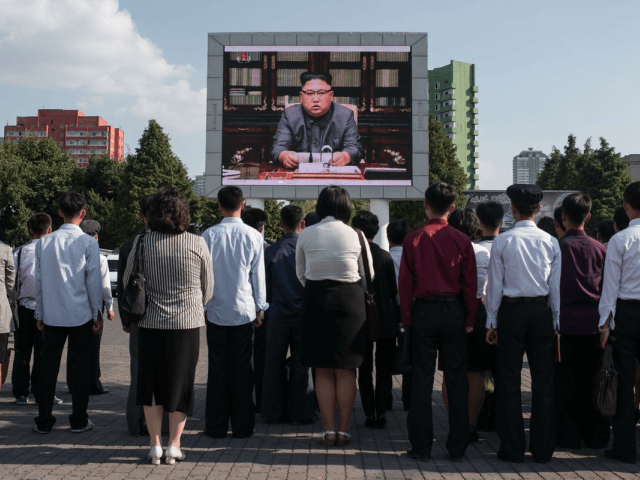The U.S. State Department and Treasury announced on Thursday the expansion of personal sanctions against high-ranking North Korean officials, following the publication of a report accusing them of extreme human rights violations including rape, torture, and use of slave labor.
Among the nations implicated are Minister of Labor Jong Yong Su, Military Security Command head Jo Kyong-Chol, and External Construction Bureau director Kim Kang Jin, according to State Department spokeswoman Heather Nauert.
Nauert noted in a statement Thursday that the individuals named are now on the Treasury’s List of Specially Designated Nationals and Blocked Persons. CNBC notes that these sanctions now “freeze any property or interest in property within U.S. jurisdiction and generally prohibit any transactions by U.S. citizens with any of the sanctioned individuals or groups.”
Nauert listed among the human rights violations in question “extrajudicial killings, forced labor, torture, prolonged arbitrary detention, as well as rape, forced abortions, and other sexual violence inside the country.”
The State Department also released a more extensive report, adhering to legal requirements on regular updates regarding the human rights situation in North Korea, explaining which officials and which ministries were committing which crimes.
The Military Security Command (MSC), the State Department explains, is in charge of disciplining the nation’s military, which in turn is turned against the North Korean people as a terror mechanism. The new sanctions target, among others, the highest-ranking officials within the MSC because witness reports and other evidence suggests the agency uses torture and extra-judicial killing against those considered political liabilities within the military.
“We are especially concerned with the North Korean military, which operates as secret police, punishing all forms of dissent. Further, the military operates outside of North Korea to hunt down asylum seekers, and brutally detains and forcibly returns North Korean citizens,” Treasury Secretary Steven Mnuchin said in a statement announcing the sanctions.
Officials within the North Korean Labor Ministry’s leadership comprises most of the other individuals sanctioned, including Minister of Labor Jong. The Labor Ministry, the State Department contends, engages in regular use of slave labor to both fuel the lifestyles of the nation’s elite and fund the nation’s rogue military programs. The agency, State alleges, “compels lower-class North Koreans to join paramilitary forced labor brigades that essentially serve as slave labor for the regime.”
Class in North Korea is heavily dependent on songbun, a caste system in which the government determines a family’s socioeconomic status based on how loyal their ancestors were to the Kim family during the founding of the North Korean regime. Individuals with relatives who are so much as suspected to oppose communism are forced to live in far-flung, rural areas in dire conditions, later harvested for slave labor.
Also on Thursday, the NGO Committee for Human Rights in North Korea (HRNK) released a report using satellite images to document Pyongyang’s continued existence and use of slave labor camps to oppress its people. The labor camps in these images reportedly belong to the North Korean Ministry of Public Safety and house criminals “convicted” by what North Korea claims as a fair judicial system.
“Policies that combine forced labour with deliberate starvation, inadequate medical care and poor hygiene conditions cause the death of thousands of inmates annually,” the report argues, noting that treatment in these camps may be superior to that faced by political “criminals” or those suspected of being Christians.
The United Nations warned on Thursday that American actions against these human rights abuses “might have a negative impact on vital economic sectors” in North Korea. North Korean state media, meanwhile, continued to publish its daily invective against the United States.
“The U.S. seems to regard the sanctions and military pressure as the last card of its hostile policy toward the DPRK but the DPRK is countering the last card with the revolutionary strategy of counteraction to foil it with the line of the simultaneous development of economic construction and the building of nuclear force,” a column in Rodong Sinmun, the state newspaper, read on Friday. “The only answer we can give to the escalating threat of aggression and sanctions and pressure is the toughest counteraction.”

COMMENTS
Please let us know if you're having issues with commenting.